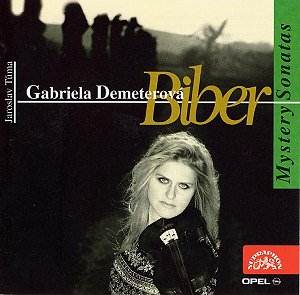|
|
Search MusicWeb Here |
|
 |
||
|
Founder:
Len Mullenger (1942-2025) Editor
in Chief:John Quinn
|
|
|
Search MusicWeb Here |
|
 |
||
|
Founder:
Len Mullenger (1942-2025) Editor
in Chief:John Quinn
|
 |
Heinrich Franz BIBER
(1644-1704) Mystery Sonatas 1-7 Passacaglia Jaroslav Tuma, organ Recorded Mirror Chapel, Klementinum, Prague March 1996 |
| CD available for post-free online mail-order or you may download individual tracks. For some labels you can download the entire CD with a single click and make HUGE savings. The price you see is the price you pay! The full booklet notes are available on-line. | |
|
NOTE • Click on the button and you can buy the disc or read the booklet details • You can also access each track which you may then sample or down load. • Further Information. |
|
|
The fifteen Mystery Sonatas, of which Demeterova and Tuma perform the first seven in the first volume of the complete set, date from approximately 1674 and are works of the utmost spirituality. They were written by Biber, himself a virtuoso violinist and a technical innovator, as representative of moments in the lives of Christ and the Virgin Mary but they are pictorial and not obviously representational. The Mysteries are presented sequentially – the five Joyful mysteries followed by the five Sorrowful Mysteries and finally the five Glorious Mysteries – and ending, properly speaking, with the great unaccompanied Passacaglia (which however ends this disc).
One of Biber’s innovations was the use of scordatura – a retuning of the violin from the standard fifths – and this is a pervasive feature of the Sonatas in this excellent performance by the young Czech violinist Gabriela Demeterova and organist Jaroslav Tuma. Whilst the structure of the Sonatas is broadly quite loose - the Fourth is a single movement Chaconne, the third in five movements for example – the impulse is always towards an admixture of dance rhythms and spiritual contemplation. Demeterova lightens her tone – she plays a modern violin and is a well-known exponent of the nineteenth century Romantic literature amongst other things – in the opening movement of the Sonata devoted to the Visitation; she has a simplicity and an imaginative lyricism that is well attuned to the interior qualities of Biber’s Sonatas. Tuma is a most understanding partner, not least in the Allemande of the same work, though he tends to maintain a discreet reticence for most of the time (when he does assert himself, as in the scourging fierceness of his interjections in the concluding Sarabande of Sonata VII, Christ’s Flagellation, it rather makes one wish that he had been somewhat more interventionist earlier).
Nevertheless there is an enormous amount to admire here; the strong line of the Praeludium of Sonata V, the independent lines of the immediately following Allemande, devoted to the Dispute with the Doctors (its narrative and pictorial implications quite clear) and the remarkable depth of the Lamento of Sonata VI – Christ’s Suffering on the Mount of Olives. These are some of the most profoundly introspective, technically advanced and spiritually intense moments in the instrumental literature of the baroque and an analogue to Bach’s Passions. Most extraordinary is the almost uplifting Allemande that introduces Christ’s Flagellation, a moment of unremitting dignity and transcendence. To all of these moments the performers are intensely alive. Whilst other recordings employ a larger continuo group than simply the organ, Demeterova’s rapport with Tuma is conclusive and sensitive and quite sufficient to convey the depth and the humanity of these remarkable Sonatas.
Jonathan Woolf
|
|
ADDITIONAL INFORMATION •
You can sample only 30 seconds (or 15% if that is longer) of a given track. Select from the View tracks list. Each sample will normally start from the beginning but you can drag the slider to any position before pressing play. • PLEASE NOTE: If you are behind a firewall and the sound is prematurely terminated you may need to register Ludwig as a trusted source with your firewall software.
•You will need Quicktime to hear sound samples. Get a free Quicktime download here • If you cannot see the "Sample All Tracks" button you need to download Flash from here.
|
|
|
Return to Index |